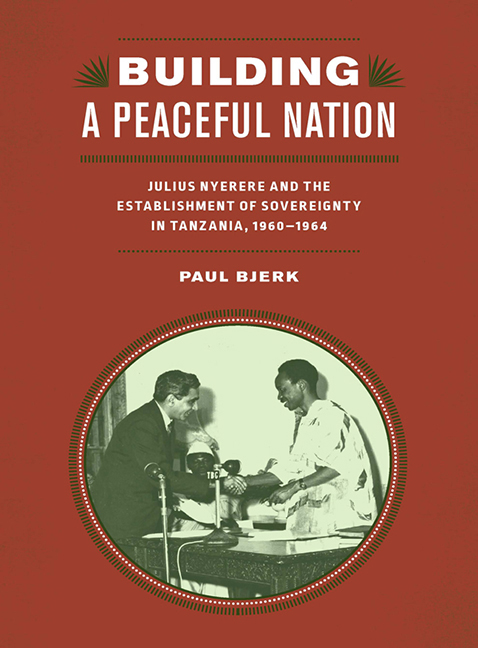 Building a Peaceful Nation
Building a Peaceful Nation 1 - The Education of Julius Nyerere
Published online by Cambridge University Press: 08 May 2021
Summary
In 1943 Julius Kambarage Nyerere joined Andrew Tibandebage in a student political group at Makerere University in Uganda, where they discussed how Tanganyika might gain its independence by making a claim to the United Nations Trusteeship Committee. After finishing studies at Makerere University in 1945, Nyerere took up a teaching post at St. Mary's Secondary School in Tabora, Tanganyika and threw himself happily into his duties. With Tibandebage, Nyerere coached a debating team at St. Mary's and made a deep impression on an upcoming generation at the neighboring Tabora Boys’ School. Rashidi Kawawa, Job Lusinde, and Oscar Kambona all became leaders in the independence movement, in large measure inspired by this enthusiastic young teacher and his debating club. Nyerere kept in close touch with friends back home, including James Irenge, his teacher from Mwisenge Native Authority School who saw his leadership potential and quietly nurtured Nyerere's political ambition during his former pupil's regular visits home.
In 1949 Nyerere traveled to Edinburgh University in Scotland, as one of a small group of East Africans who were given scholarships to study in the United Kingdom. A university education abroad was the final step in a colonial educational track reserved for a small group of top students that would help transform African society into a more European one—or so officials hoped. They were trained as teachers, doctors, and social workers. Nyerere was a typical member of the independence generation described by Frederick Cooper: “Leaders—western educated, but rarely more than one generation removed from their milieux of origin—saw themselves as choosing the best of what Europe and Africa had to offer.” While local ideas nourished their hearts, the driving philosophy of the colonial education they imbibed was British Utilitarianism. Probing Nyerere's educational journey offers insight into the broader intellectual discourse that offered young African elites the means to pierce metropolitan prejudices and transform the justifications of colonial rule into a rationale for independence.
Nurturing a Political Vision
Born in 1922, Nyerere grew up in a small hilltop village called Butiama, some miles inland from the eastern shore of Lake Victoria, on the edge of what is now the Serengeti National Park.
- Type
- Chapter
- Information
- Building a Peaceful NationJulius Nyerere and the Establishment of Sovereignty in Tanzania, 1960–1964, pp. 23 - 33Publisher: Boydell & BrewerPrint publication year: 2015


